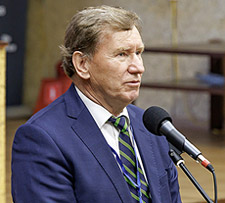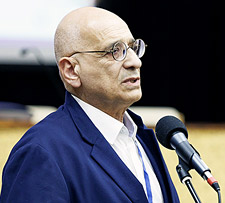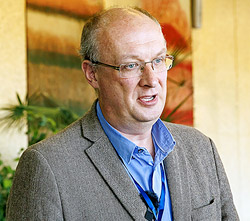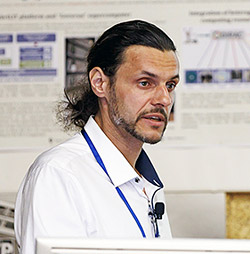
Electronic english version since 2022 |
The newspaper was founded in November 1957
| |
Meridians of cooperation
MPQIT-2024 Meeting: the time has come
The International Workshop on Mathematical Problems of Quantum Information Technologies was held in a mixed format at MLIT JINR on 27-28 May. It brought together specialists from Belarus, Great Britain, Georgia, Egypt, India, Russia and Serbia in the field of quantum information theory, quantum communications, quantum computing, simulation and algorithms.
The participants of the meeting were welcomed by JINR Vice-Director L.Kostov, MLIT Director S.Shmatov and co-chairs of the Organizing Committee of the Meeting A.Khvedelidze and V.Korenkov. D.El-Fiqi (Academy of Scientific Research and Technology of Egypt) addressed the participants with a welcoming speech.
 |
 |
| Co-chairs of the Conference Organizing Committee Vladimir Korenkov and Arsen Khvedelidze | |
"We have hold three large conferences in our laboratory," Vladimir Korenkov reminded. "This is a conference on grid technologies that is always held in Dubna; a conference that we hold together with our friends from Slovakia, "Mathematical Modeling and Computational Physics" - MMCP; the NEC conference. We revive those conferences that were suspended and this year, MMCP will be held in Yerevan. Next year, we will probably announce NEC, we do not know where yet. We have been saying for many years that we lack a fourth powerful conference dedicated to quantum computers and this working meeting will become the basis for a future conference to create its team and prepare an international community of participants.
Our Laboratory has had a sector of analytical and quantum computing for quite a long time, headed by Vladimir Gerdt. For many years, he has held small working meetings on analytical and quantum computing in May. Today, we have decided to expand them, since quantum computing increasingly becomes a trend in the development of information technology. There are many mysteries, many issues and complex aspects here, starting with the theoretical basis that we currently work on - quantum entanglement. But currently, this technology already enters the practical plane, especially with regard to optimization, quantum telecommunications and quantum security. It becomes a real manifestation of quantum technologies.
We work on algorithms using not quantum computers, but a quantum computing emulator on the Govorun supercomputer: we emulate about 40 qubits and try to meet various issues. Among the issues in which we have not yet made much progress is the simulation of superheavy elements. Yuri Oganessian set us the task of finding the limit of the Periodic Law: up to what element exactly it works. The task is super-heavy, all the computers in the world are not enough to meet it and we try to advance in this ideology, using both conventional supercomputers and a quantum computing emulator.
The second super-task we work on is the optimization of problems for the NICA accelerator complex. We started with the optimization of the cooling process of superconducting magnets so that the single process would be faster, more efficient and controllable. And the next stage is maintaining all superconducting magnets in an optimal state. This is a real task that we work on and it uses a whole stack of technologies: deep machine learning, quantum and many, many other things that allow us to optimize this process."
Do you think the Meeting was a success?
"It is difficult to evaluate the result yet, but I think we succeeded, we managed to invite specialists from most of the quantum centres of Russia, two powerful reports were given. One of them shows the policy in the field of quantum computing in Egypt and the second review was given, I believe, by one of the greatest modern experts in quantum computing technologies S.Ya.Kilin (Belarus). His report should have been given not half an hour, but at least two and a half. I hope that this working meeting will cause a certain resonance and most importantly, that it will generate optimism in our Institute, so that the team that deals with quantum technologies will expand and advance knowledge in this area to a higher level."
 |
| Sergey Shmatov: "We must be ready..." |
As follows from the answer to your question by S.Ya.Kilin, it should not be expected in the near future...
"Yes, that is why I asked him this question and my point of view is the following: on the horizon of 25 years, we can hardly expect significant changes in the approach to computing and the ideology of processing and analyzing information, but we should, of course, carry out further scheduled preparations and be ready for the fact that we will one day have such tools and such algorithms that will allow us to use the power of quantum computers. Also, as Sergey Yakovlevich quite correctly said, we can use a united approach, in which some developments from quantum computing are used together with traditional supercomputers in order to develop accelerators for a supercomputer. I hope that the meeting will help us to look at this from a new angle and some new point of view will appear."
"We have been moving towards this conference for a long time, since 2015 and were already going to hold it in 2020, but the COVID pandemic began," A.Khvedelidze recalls. "This activity began in our laboratory by Vladimir Gerdt in the 2000s. Today, the time has come when it is no longer possible to postpone it. At present, we tried to gather people that work in various areas related to quantum computers - on the one hand, they deal with hardware and on the other hand, they deal with purely algorithmic things, mathematical problems. Specialists from several Russian centres came to us - the Steklov Mathematical Institute, St. Petersburg, Russian quantum centres - Moscow State University and Skolkovo. In addition, the meeting was opened by a representative of Egypt D.el-Fiqi, this area is extremely interesting for the Member States."
We also remembered V.P.Gerdt with N.N.Vasiliev (St. Petersburg Department of the Steklov Mathematical Institute):
"Yes, Vladimir Petrovich would be pleased, but I do not quite agree that it began with seminars and has grown into a meeting. It all began with very large international conferences on computer algebra, the first one was held during the lifetime of Nikolay Govorun and Vladimir Petrovich became its driving force. Dubna was the centre where computer algebra developed. Bruno Buchberger, a living classic of computer algebra and many others came to the second conference that was held in 1980. Afterwards, international conferences of such significance stopped and small seminars were held that later became annual. V.P. Gerdt headed the sector of algebraic and quantum computing and even during his lifetime there was talk about both of these areas being reflected in conferences. Today, we can again participate in meetings of a very high scientific level, see our friends, colleagues and carry out our cooperation.
"The impressions from the meeting are wonderful," Dimitar Mladenov (Sofia University, Bulgaria) shares with me. "Arsen, my friend and associate, together with his colleagues did an excellent job of organizing it. I heard both familiar things and a lot of new things here. The goal of such meetings is not only to exchange new information, but also to organize a network of quantum centres that would work in a mode of constant information exchange. All the outstanding Russian quantum centres were represented here and today, new centres are established in different regions of Russia, I know that they are in Novosibirsk, in the Far East. It is necessary to attract new participants, as well as specialists from the Member States, for this area is not even fashionable but I would say, strategic and such a meeting is a significant step for this entire community.
 |
| The report is given by Martin Buresh |
Such is the irony of fate: Yu.G.Paliy and I started working on quantum algorithms only after V.P.Gerdt's death. I think he would have been very pleased to see that his work is carried out and that almost his entire group to one degree or another works on various aspects of quantum algorithms. And last year, I finally started working on an applied problem, collaborating with Gennady Ososkov and Ivan Kadochnikov - tracking particles of the NICA collider. As it turned out, there are many quantum algorithms that are applicable specifically to particle tracking, so we currently work on this intensively and I talked about it today.
"In my opinion, this meeting continues the MLIT traditions of the early 2000s, when they proposed and V.G.Kadyshevsky and A.N.Sisakyan supported, holding a series of conferences "Quantum Physics and Communications," A.V.Chizhov (LRB) noted. "They attracted a huge number of world experts and enjoyed enormous success. Then this series was interrupted and I am very pleased that the current conference becomes a natural continuation, as it seems to me, of those conferences, the embodiment of those ideas that were laid down in our Institute and they, I am sure, will continue.
"Quantum computers are difficult not only in terms of implementation, but also in a philosophical sense," I shared with A.Khvedelidze after his final report at the meeting.
"Indeed, it is difficult. Regarding computational processes, a colleague from the Russian Quantum Centre Skolkovo presented a report at the meeting, in which the issue of how to formulate computations in terms of qudits was discussed. Qudits are a d-level system, unlike two-level qubits that allow for the implementation of more complex logic (for example, ternary logic is related to the use of qutrits (three-level systems). It raises the question of whether there are qubits inside the qudits and how it will make computations more efficient. In my report, I tried to consider the following issue: there is a four-level quantum system and what is the probability that, for example, a pair of two-level ones lives in it? This issue is directly related to the efficiency of computations - should we calculate in terms of two-qubit systems or four-level ones, when you perceive a four-level system as elementary. After all, if you know that it consists of two-qubit subsystems, you reduce the uncertainty. It is interesting that in such investigations, in specific calculations, there is a reflection of the complex philosophical problem of "part and whole". And it often happens that in your work, following certain philosophical ideas, you move in one area, but in the process of calculations you come across something completely unexpected that makes you change both your ideas and your original intentions. Perhaps it will happen with quantum calculations, but in any case, we should go through this extremely intriguing path.
Arsen concluded his report with a quote from the abstract of D.I.Blokhintsev's papers "My Path in Science": "I was very pleased to establish that quantum mechanics deprives the world of the bleak face that primitive determinism imposes on it. In the light of this science, the whole world appears as a gambling game of inventive chance."
Olga TARANTINA,
photo by Elena PUZYNINA
From the report by S.Ya.Kilin: 25 years ago, a review on quantum information was written. We all thought that quantum computers would be implemented quickly, but everything happens quite slowly... 25 years have passed and only today, we can say that society has realized that these technologies are revolutionary. They will require many achievements, physical and technical, before they will achieve results that are modest in parameters but fantastic in resources.
...Developing a universal quantum computer is too complex task to schedule exact dates. The development of a small-scale quantum computer comes to the forefront. The task of developing a universal quantum computer cannot be accelerated by market instruments; it is a science-intensive solution, although technological progress over the past quarter of a century has been significant.